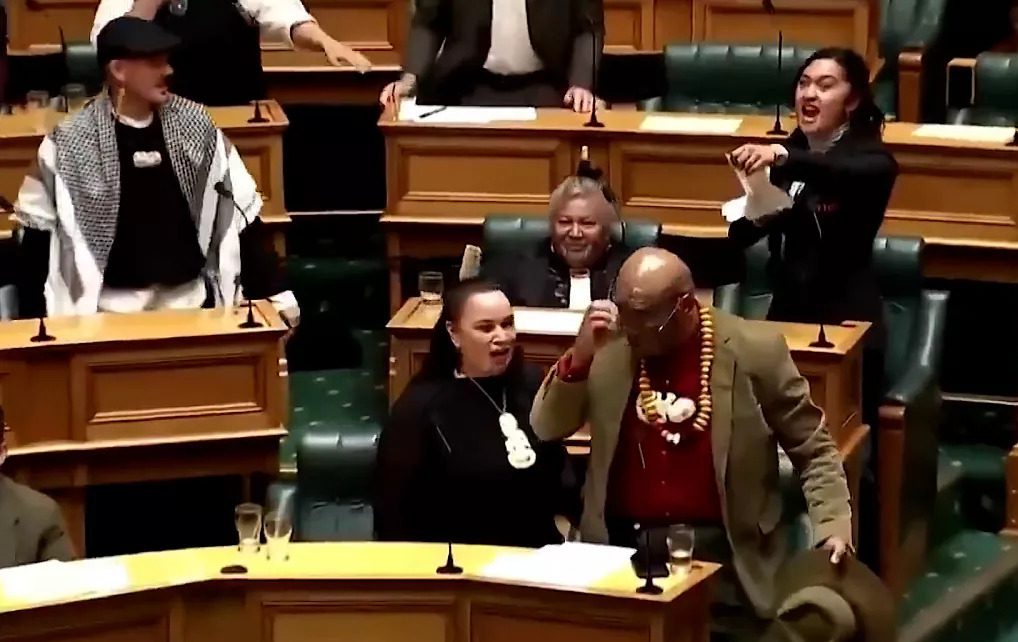
Māori MPs Receive Record Suspensions Over Haka Protest Against Treaty Bill in New Zealand Parliament
- World News
- June 6, 2025
- No Comment
Report by “Safarti Tarjuman” International News Desk
WELLINGTON, New Zealand’s parliament has issued the most severe suspensions in its history to three Māori Party MPs following their dramatic haka protest against proposed changes to the Treaty of Waitangi.
Co-leaders Rawiri Waititi and Debbie Ngarewa-Packer were suspended for 21 sitting days, while Hana-Rāwhiti Maipi-Clarke, aged 22 and the youngest MP, was suspended for seven days. The disciplinary action came after the trio performed a haka in the debating chamber during a heated session last November.
The haka was performed as a protest against the Treaty Principles Bill, which sought to reinterpret the 1840 Treaty of Waitangi — a document that underpins Māori-Crown relations in New Zealand. The proposed bill was widely criticized as an attack on Māori rights and sovereignty.
During the protest, Maipi-Clarke tore up a copy of the bill and launched into a haka, followed by Waititi and Ngarewa-Packer. The haka caused parliamentary proceedings to be temporarily suspended.
Ngarewa-Packer was also accused of making a threatening gesture towards ACT Party leader David Seymour, who introduced the bill.
Speaking after the suspensions were passed with backing from the ruling coalition, Maipi-Clarke declared,
> “We stood for the foundational document of this country and were punished with the most severe penalties.”
She criticized the double standards in disciplinary actions, noting that more disruptive or violent behavior by other MPs had gone unpunished.
According to parliamentary records, no MP has faced a suspension longer than three days in the past decade. The 21-day bans now imposed mark the harshest sanctions in modern New Zealand legislative history.
Judith Collins, chair of the Privileges Committee and Attorney-General, defended the decision, stating,
“This is not about the haka. It’s about upholding the rules of the House that all members are bound to follow.”
The Labour opposition opposed the penalties, calling them excessive and inconsistent with democratic norms.
Labour MP Duncan Webb said, “This action contradicts the very nature of New Zealand’s democratic values and sets a dangerous precedent.”
He also criticized the ruling coalition for using its numerical majority to push through the suspensions despite divided committee opinions.
While some MPs criticized the timing of the haka, many across the political spectrum acknowledged its cultural importance. Supporters are now calling for parliamentary rule changes to formally recognize Māori protocols such as haka as legitimate forms of political expression.
Examples were cited of past adjustments to parliamentary rules, including the acceptance of breastfeeding in the chamber, as precedent for inclusive reform.
The Treaty Principles Bill, which ignited the controversy, was ultimately defeated in parliament. However, its introduction triggered one of the largest Māori-led protest movements in recent years.
A hikoi (march) of nearly 40,000 people converged on parliament’s steps in late November 2024. The Māori Party was at the forefront of the protest movement, mobilizing support both inside and outside the legislature.
The bill’s defeat was seen as a major victory for Indigenous rights advocates, but tensions surrounding Māori representation in politics remain high.
Thank you for reading! For comprehensive news coverage and exclusive stories, visit SafartiTarjuman.com





